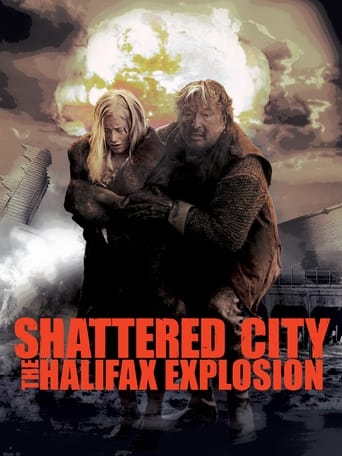

I had friends that were in this movie so you will have to excuse my bias. First off the writing was adequate. I enjoyed the addition of some intrigue before the explosion, I had heard the conspiracy theories about German saboteurs before and the writers did a good job of myth building without re-writing history. The acting was pretty much the CBC standard which is acceptable in a docu-drama what really stood out about this film was the terrible directing and cinematography, there was even one of those classic pan reaction shots when the disfigured soldier killed himself the only place you see those is in comedy shows these days! Looking at Pittman's filmography I understand now why so many Canadian television shows have a similar look and I mean that in a bad way.I'm very happy a movie was made in Halifax about Halifax and I am sure it will be shown to delighted junior high students for decades to come.
... View MoreThe Halifax Explosion was a turning point in Canadian history. It shook a young country, but left it stronger, if not more sober.The CBC's "Shattered City" uses fiction to tell the story of the Halifax Explosion. Some of the actors put in good performances, although many are stiff. My major grievance is with the use of fiction. The viewer is not able to discern truth from fantasy. In fact, at the film's conclusion, a short clip shows the actors explaining they had not ever learned anything about the Hfx Explosion. This may be true for many Canadians, as well as people in other countries. The story has little to teach us, because it fails to recognize the greatness of the real story.
... View MoreIt was nice to see another good movie about the Maritimes. There were certain things that lacked or needed more explanation, but on the whole it was an enjoyable movie based on true events. Most people have never even heard of the Halifax explosion; so, this movie should provide some info. The actors did a good job portraying their characters. It was wonderful to see Zachary Bennett (Ernest) again, whom most would remember as Felix King in the "Road to Avonlea" series. Unfortunately his character only appears in the first part and we never hear of him after that. This is a good movie to sit back in the evening and enjoy.
... View MoreCBC is doing what it is supposed to do and it's hard to fault them for that. This story of the Halifax Explosion of 1917 is good but it could be much better. It's also plagued by small errors. (A CNR logo in 1917? WW2 style posters in WW1. A 1930's folding camera with a flash? I don't think so. I spotted these in the first episode. I'm sure there were others.) The characters in the stories woven through the tragedy are both predictable and one dimensional. However the drama leading up to the explosion is well executed and the recreation of Halifax harbour full of old ships is effective. It's good but falls far short of being great.
... View More